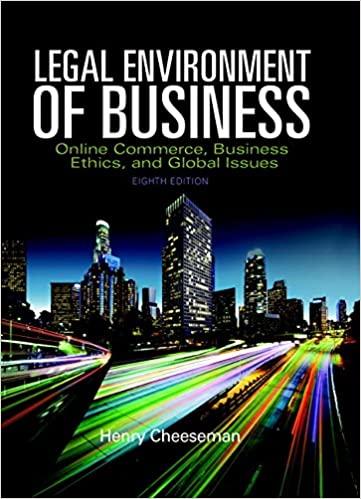Question
1. The president of A Co. introduces B to a third party as his vice-president of marketing and sales. In reality, however, A Co.'s president
1. The president of A Co. introduces B to a third party as his vice-president of marketing and sales. In reality, however, A Co.'s president makes it clear to B that he is only the vice-president of marketing and has no authority to make sales. If B now enters into a contract for the sale of A Co.'s goods to the third party, as between A Co. and the third party,
| 1. | there is a contract because B had apparent or ostensible authority to enter into it. | |
| 2. | there is no contract because B can only deal with matters of marketing. | |
| 3. | none of the above | |
| 4. | there is no contract because B does not have express authority over sales. | |
| 5. | there is no contract because it was not ratified by A Co. |
2. When we talk about a legal person, we mean
| 1. | A legal person is someone who has all of their immigration documentation up to date. | |
| 2. | a legal person is the term used for a machine or inanimate object with rights but not a natural person. | |
| 3. | an entity, indistinct from a natural person, recognized by law as having rights and duties of its own. | |
| 4. | an entity, distinct from a natural person, recognized by law as having rights and duties of its own. | |
| 5. | a natural person only, recognized by law as having rights and duties of its own. |
3. Are there any restrictions on a corporation paying dividends to its shareholders?
| 1. | As per s. 42 of the CBCA, a corporation may not pay a dividend if (1) there are reasonable grounds for believing that the corporation is, or would after the payment be, unable to pay its liabilities as they become due; and (2) if the realizable value of the corporation's assets would thereby be less than the aggregate of its liabilities plus its stated capital of all classes. | |
| 2. | There are no restrictions on a corporation paying dividends because a corporation exists to make a profit for shareholders and therefore restricting sharing the profits is anathema to a corporation's reason for existing. | |
| 3. | The only restriction is what a corporation decides. | |
| 4. | As per s. 42 of the CBCA, a corporation may still pay a dividend to shareholders even if (1) there are reasonable grounds for believing that the corporation is, or would after the payment be, unable to pay its liabilities as they become due; and (2) if the realizable value of the corporation's assets would thereby be less than the aggregate of its liabilities plus its stated capital of all classes. | |
| 5. | The only restriction is what shareholders decide. |
4. Yuri makes a gratuitous promise to Rav, fully intending to keep his promise. However, Yuri later finds it inconvenient to perform what he promised. Meanwhile, Rav has reasonably relied on Yuri's promise and has incurred expenses that he would not have otherwise incurred. What happens? Does Rav have any hope of relief?
| 1. | The principle of equitable estoppel, where the court exercises its equitable jurisdiction to estop a promisor from claiming that he was not bound by his gratuitous promise where reliance on that promise caused injury to the promisee, may provide some relief. | |
| 2. | Yes, there is relief. Rav can sue Yuri for breach of contract under the strict rules of contract law. | |
| 3. | Yuri may rely on the principle of equitable estoppel to defend himself against Rav's lawsuit, on the basis that his promise was a gratuitous one. | |
| 4. | A lawsuit happens next - a gratuitous promise is a promise like any other promise and can be enforced. | |
| 5. | all of the above. |
Step by Step Solution
There are 3 Steps involved in it
Step: 1

Get Instant Access to Expert-Tailored Solutions
See step-by-step solutions with expert insights and AI powered tools for academic success
Step: 2

Step: 3

Ace Your Homework with AI
Get the answers you need in no time with our AI-driven, step-by-step assistance
Get Started


